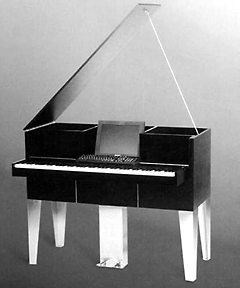 |
I was 11 years old when I started to play the local church organ. The feeling that I had when entering that sacred building, using the key to open the organ cabinet, being able to decide what chords I would play, and how loud a sound I wanted to make, the smell of churches, the smell of the wood of the organ...that was magic
.
Some 10 years later, when I started working with digital audio equipment, it was my ambition to recreate that excitement. I worked with samples of acoustic instruments. By creating an ultra-realistic organ sample, I could get the same feeling of magic as I experience so many years ago.
When I now hear one harpsichord sample I created for a specific opera, I can actually smell the wood of the instrument that was so typical and so special to that one instrument. When I now hear a particular organ sound, I expect to feel the flow of air of the organ pipes coming from one of the loudspeakers...
Many times, during my years working for the Dutch Opera company, I would stand at the side of the stage, or sit in the auditorium, or in the orchestra pit. There's a very special moment when the lights in the auditorium go out, and the curtain opens to reveal the stage in total darkness. The orchestra is silent. The conductor raises his arms for the first opening bars. The audience is intensely concentrating. And then the show begins!
That moment, too, is pure magic! Musician, singers, composers and conductors have share this intense emotional reaction. This is what making music is all about: shared communication, the expression of a feeling, a message, a story, an idea, an image.
But composers face a huge dilemma: how to use musical instruments to reproduce the almost endless range of magical sounds that they have in their minds whilst composing. They work alone, without an orchestra to try things out with.
 |
Post Piano, by Michiel Post,
(design by Piet Hein Eek) |
One barrier that has to be crossed is the instrument, which for most composers has usually been a single piano. Seated on a piano bench the composer can imagine the sound of – let’s say - a Chinese gong, but in order to make the sound audible he will have to play notes on the piano keyboard to achieve a comparable result.
Another limitation is the difficulty of trying out your composition using a 100 person orchestra, a 50 man choir, 15 pianos, several Chinese gongs, and maybe a big band. It's simply not feasible in financial or practical terms. The limitations of real-life situations will force the composer to change the original concept, the original plan.
Wouldn't it be great if we could offer musicians and composers - who have the potential to create magical experiences for the rest of us - new tools, new possibilities, new technologies that they can use to create music closer to their original concepts?
My invention, the post piano, is based on new technology that uses up to five Gigabytes of sound samples for a single instrument. It uses detection algorithms to apply up to 16 layers of samples to 127 possible velocity steps, and it offers the user Instant availability over an unlimited amount of audio recordings.
The recordings can be 999 different percussion instruments or 1.200 different grand piano samples. The system includes a searchable database and it also supports internet applications. For example, collaborative composition by people working together, but in different locations, is possible.
My time is up, and it's time for Ivo to play. I will be around after his recital, and I am hosting a breakfast table tomorrow morning where I will be happy to explore this in more detail.
http://www.postmusicalinstruments.com
http://www.postmusicalinstruments.com/basishtml/doors.html |
 |